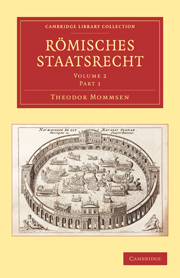Book contents
- Frontmatter
- Contents
- Das Königthum S. 3—15
- Die magistratische Befugniss des Oberpontifex S. 16—69
- Das Consulat S. 70—124
- Die Dictatur S. 125—153
- Das Reiterführeramt S. 156—164
- Der Consulartribunat S. 165—175
- Die Prätur S. 176—216
- Die Provinzialstatthalterschaft S. 217—246
- Der Volkstribunat S. 247—303
- Die Censur S. 304—442
- Die Aedilität S. 443—491
- Die Quästur S. 492—538
- Magistratische Offiziere S. 539—545
- Die magistratische Geschwornenleitung S. 546—555
- Der Vigintisex-, später Vigintivirat S. 556—571
- Ausserordentliche Beamte für die Reservatrechte der Gemeinde S. 572—600
- Ausserordentliche Aushülfsbeamte S. 601—637
- Die Senatsboten (legati) S. 638—661
- Die ausserordentlichen constituirenden Gewalten S. 662—697
Magistratische Offiziere S. 539—545
Published online by Cambridge University Press: 29 August 2010
- Frontmatter
- Contents
- Das Königthum S. 3—15
- Die magistratische Befugniss des Oberpontifex S. 16—69
- Das Consulat S. 70—124
- Die Dictatur S. 125—153
- Das Reiterführeramt S. 156—164
- Der Consulartribunat S. 165—175
- Die Prätur S. 176—216
- Die Provinzialstatthalterschaft S. 217—246
- Der Volkstribunat S. 247—303
- Die Censur S. 304—442
- Die Aedilität S. 443—491
- Die Quästur S. 492—538
- Magistratische Offiziere S. 539—545
- Die magistratische Geschwornenleitung S. 546—555
- Der Vigintisex-, später Vigintivirat S. 556—571
- Ausserordentliche Beamte für die Reservatrechte der Gemeinde S. 572—600
- Ausserordentliche Aushülfsbeamte S. 601—637
- Die Senatsboten (legati) S. 638—661
- Die ausserordentlichen constituirenden Gewalten S. 662—697
Summary
Wie das römische Gemeinwesen den Feldherrn als solchen nicht kennt, sondern das Feldherrnrecht darin eio nothwendiger Bestandtheil der höchsten Amtsgewalt ist, also der Inhaber desselben als Beamter von der Bürgerschaft gewählt wird, so kennt sie umgekehrt ursprünglich keinen anderen Offizier, als den der Feklherr ohne Mitwirkung der Gemeinde ebenso auswählt wie den letzten gemeinen Soldaten. Es ist keine Ausnahme von dieser Ordnung, sondern nur eine Bestätigung derselben, dass, wenn die Wahl der regelmässigen Inhaber des Feldherrnrechts unterbleibt, die ihnen im Rang folgenden und an ihre Stelle tretenden Offiziere, die Kriegstribune von der Gemeinde erwählt werden und, so weit sie aus der Volkswahl hervorgegangen sind, als Magistrate der Gemeinde nicht bloss das Feldherrn-, sondern jedes andere in der höchsten Amtsgewalt enthaltene Recht besitzen und üben. Hierauf beruht der mit consularischer Gewalt ausgestattete Kriegstribunat (S. 465 fg.), welcher indess bereits im J. 387 d. St. abgeschafft wurde (S. 475).
Aber diese streng principielle Ordnung, wonach die jedesmal Höchstcommandirenden vom Volke gewählt, also Magistrate sein müssen, die unter ihnen den Befehl ftihrenden Offiziere nicht vom Volk gewählt werden, also Magistrate nicht sein können, ist früh von zwei Seiten her alterirt worden: einmal indem die Gehtilfen der Oberbeamten, die Quästoren, anfingen gleich diesen selbst durch Volkswahl bestellt und den Consuln auch als Feldherren zunächst filr das Kassenwesen zugeordnet zu werden, womit auch im Lager ein zweiter minderer Magistrat dem ersten an die Seite trat; zweitens indem die Wahl gewisser lediglich fUr das Kriegswesen bestimmter Hülfspersonen im Laufe der Zeit auf die Comitien überging.
- Type
- Chapter
- Information
- Römisches Staatsrecht , pp. 539 - 545Publisher: Cambridge University PressPrint publication year: 2010



